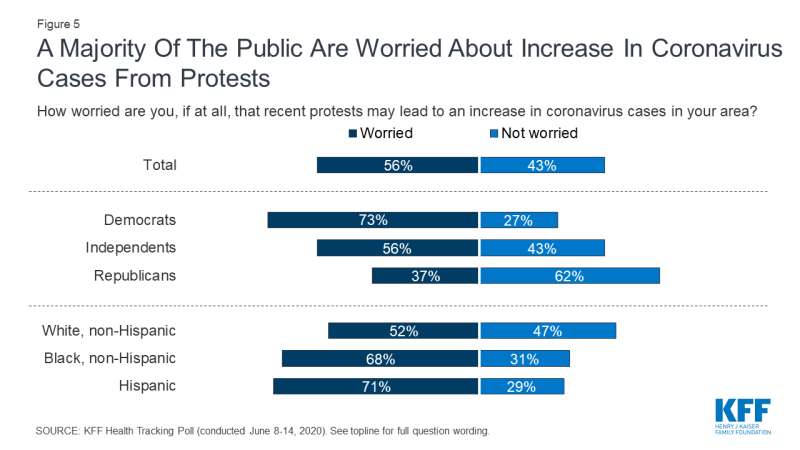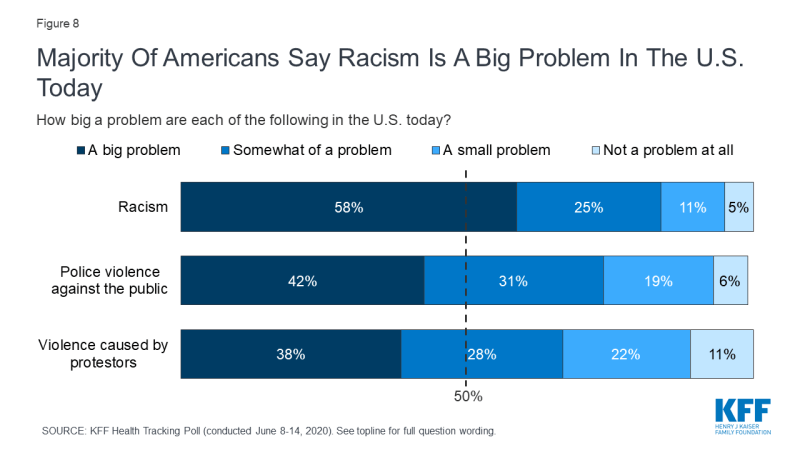KFF Health Tracking Poll - June 2020
Key Findings:
- Amid weeks of protests over the death of George Floyd that have drawn national attention to issues of institutional racism and police violence, the latest KFF Health Tracking Poll finds that seven in ten Black adults say they have experienced serious incidents of discrimination in their lifetime, including half who say they have felt their life was in danger because of their race or ethnicity, and about one in five (rising to 30% of Black men) who say they have been a victim of police violence. About six in ten Black adults also report experiencing unfair treatment in various settings in the past 12 months, including four in ten who experienced this while shopping (44%) or at a bar, restaurant, or entertainment venue (41%), and 30% who experienced unfair treatment in interactions with police. Hispanics are also disproportionately likely to report discrimination and unfair treatment compared to Whites, including 45% who report experiencing unfair treatment in the past 12 months and 41% who report ever experiencing specific serious forms of discrimination.
- Majorities of the public overall support two key reforms aimed at reducing the use of excessive force by police – banning police from using chokeholds and strangleholds and banning no-knock warrants – though Republicans are less supportive (52% support banning chokeholds and 34% support banning no-knock warrants). There is broad and bipartisan support for several other police reform proposals, including requiring officers to intervene to stop the excessive use of force by other officers, requiring verbal warnings before shooting, mandatory public release of disciplinary records, and allowing individuals to sue police officers if they feel they were subjected to excessive force.
- Two-thirds of the public support the recent protests against police violence, and 9% say they personally attended a protest or rally in the last 3 months either to protest police violence or in support of Black Lives Matter or other anti-racist causes. At the same time, a majority of the public (56%) say they are worried that recent protests may lead to an increase in coronavirus cases in their area. Democrats and Black adults – groups that are most likely to support the protests – are also among the most likely to say they are worried about the protests leading to an increase in coronavirus cases.
- Big partisan differences remain when it comes to perceptions of racism, protests, and police violence. Large majorities of Democrats say racism (82%) and police violence against the public (65%) are “big problems” in the U.S., while much smaller shares of Republicans agree (25% and 14%, respectively). Conversely, 62% of Republicans compared with 24% of Democrats say “violence caused by protesters” is a big problem. Partisan differences also extend to knowledge about the disparities faced by Black and Hispanic adults when it comes to health care and experiences with police. For example, Democrats are twice as likely as Republicans to know that Black Americans are more likely than White Americans to get sick or die from coronavirus (69% vs. 34%). Similarly, 64% of Democrats know that Black Americans are less likely than White Americans to be covered by health insurance, while most Republicans (70%) say there is no difference. Nearly nine in ten (87%) Democrats know that Black Americans are more likely than White Americans to experience police violence, while 52% of Republicans say there is no difference.
Large Shares Of Black Adults Report Experiences With Racial Discrimination
At a time when protests across the country are highlighting issues of structural racism and discrimination, 63% of Black adults and nearly half (45%) of Hispanic adults say they have been treated unfairly in a variety of situations in the past 12 months because of their race or ethnicity. Most commonly, about four in ten Black adults and about a quarter of Hispanic adults say they have been treated unfairly due to their racial or ethnic background when they were shopping (44% and 28%, respectively) or when they were at a restaurant, bar, theater, or other entertainment place (41% and 25%). Black adults (30%) are nearly three times as likely as Hispanic adults (11%) — and ten times as likely as White adults (3%) to say they have been treated unfairly in dealings with the police due to their race. About one in five Black and Hispanic adults say they have experienced unfair treatment due to their race at work (20% and 18%, respectively) and about one in six say they have been experienced unfair treatment while getting health care (17% and 14%, respectively). Very small shares of White adults say they have experienced any of these types of unfair treatment due to their racial or ethnic background.
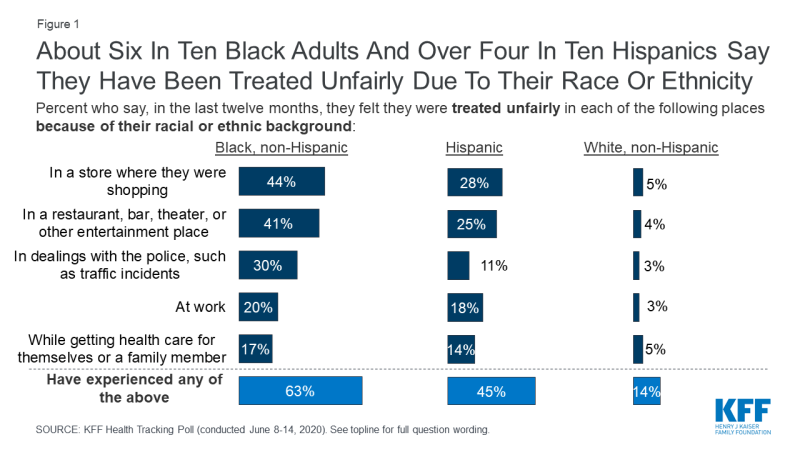
Figure 1: About Six In Ten Black Adults And Over Four In Ten Hispanics Say They Have Been Treated Unfairly Due To Their Race Or Ethnicity
When asked about more specific experiences of discrimination or violence due to their race or ethnicity, the disparities are no less stark. About half of Black adults (48%), including 60% of Black men and 38% of Black women, say they have ever been afraid their life was in danger because of their race. This compares to about a quarter (26%) of Hispanic adults and 16% of White adults. Black adults are also much more likely than Hispanic or White adults to say they have been denied a job for which they were qualified (40%, 15%, and 8%, respectively) or denied housing they could afford due to their race (26%, 8%, and 3%). When it comes to interactions with police, Black adults are more than twice as likely as Hispanic adults and eight times as likely as White adults to say they have been stopped or detained by police because of their racial or ethnic background (41%, 16%, and 5%, respectively). Moreover, about one in five Black adults (21%) – including 30% of Black men – say they have been a victim of police violence due to their racial background. Overall, seven in ten Black adults (71%) say they have ever experienced at least one of these more specific instances of discrimination due to their race or ethnicity, compared with four in ten Hispanics (41%) and a quarter of Whites (24%).

Figure 2: Nearly Half Of Black Americans Say They Have Been Afraid Their Life Was In Danger Due To Their Racial Background
Public Broadly Supports Proposals To Address Police Violence
In recent weeks following the death of George Floyd and ensuing nationwide protests, a number of reforms have been proposed to address police violence and excessive use of force. New York and Iowa have recently banned police from using chokeholds or strangleholds, Congressional Democrats have introduced a police reform bill to address racism and excessive force by police, and U.S. Representatives Justin Amash and Ayanna Pressley have introduced a bill to end qualified immunity for police officers, which would make it easier for victims of police misconduct to successfully sue officers in civil court.1,2
When asked about a number of proposals aimed at reducing excessive use of force by police officers, majorities of the public express support. Americans overwhelmingly support requiring police to intervene and stop excessive force used by other officers and report these incidents (95%) and requiring police to give a verbal warning, when possible, before shooting a civilian (89%). About three in four support requiring states to publicly release disciplinary records for law enforcement officers (76%) and allowing individuals to sue police officers if they feel they were subjected to excessive force (73%). Two-thirds support banning police from using chokeholds and strangleholds (68%) and about half (52%) support banning no-knock warrants that allow police to enter a person’s residence unannounced.
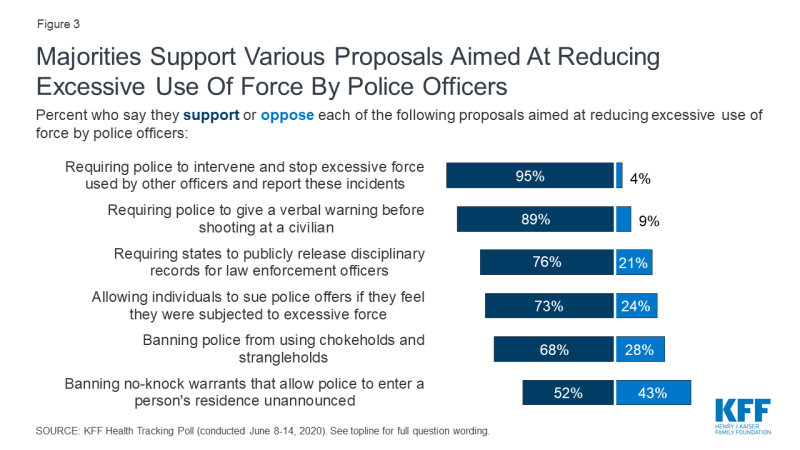
Figure 3: Majorities Support Various Proposals Aimed At Reducing Excessive Use Of Force By Police Officers
There is bipartisan support for many proposals aimed at reducing police violence, including requiring officers to intervene to stop the excessive use of force by other officers, requiring verbal warnings before shooting, mandatory public release of disciplinary records, and allowing individuals to sue police officers if they feel they were subjected to excessive force. When it comes to banning police from using chokeholds and strangleholds, large majorities of Democrats (82%) and independents (70%) are in support, compared with a bare majority (52%) of Republicans. And while majorities of Democrats and independents support banning no-knock warrants, only about a third of Republicans (34%) support this proposal.
| Table 1: There is bipartisan support for many policies aimed at reducing police violence. | |||
| Percent who support each of the following proposals: | Democrats | Independents | Republicans |
| Requiring police to intervene and stop excessive force used by other officers and report these incidents | 97% | 96% | 95% |
| Requiring police to give a verbal warning before shooting at a civilian | 95 | 90 | 83 |
| Requiring states to publicly release disciplinary records for law enforcement officers | 89 | 75 | 62 |
| Allowing individuals to sue police officers if they feel they were subjected to excessive force | 85 | 74 | 55 |
| Banning police from using chokeholds and strangleholds | 82 | 70 | 52 |
| Banning no-knock warrants that allow police to enter a person’s residence unannounced | 65 | 56 | 34 |
Most Support Recent Protests Against Police Violence; One in Ten Say They Have Participated
About two in three Americans (64%) support the recent protests against police violence while three in ten oppose the protests (30%). There are sharp partisan divisions on the recent protests with an overwhelming majority of Democrats (86%) and two in three independents (67%) saying they support the protests while about six in ten Republicans (57%) oppose. Majorities across racial/ethnic groups support the protests including about eight in ten Black Americans (84%) and about six in ten White Americans (61%) and Hispanics (64%).
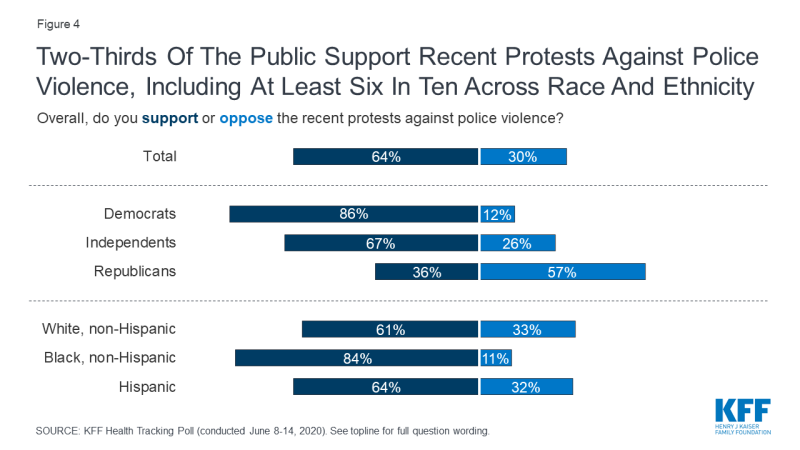
Figure 4: Two-Thirds Of The Public Support Recent Protests Against Police Violence, Including At Least Six In Ten Across Race And Ethnicity
At the same time that a majority of the public supports the recent protests, more than half (56%) say they are very or somewhat worried that protests may lead to an increase in coronavirus cases in their area. Notably, Democrats and Black adults – groups that are most likely to support the protests – are also among the most likely to say they are worried about the protests leading to an increase in coronavirus cases (73% and 68% respectively).
Eleven percent of adults say they have attended a protest, march, or demonstration in the last three months, including 9% who say they attended an event to protest police violence or in support of Black Lives Matter or other anti-racist causes (less than 1% of adults say they attended a protest to ease stay-at-home restrictions implemented due to coronavirus in the past three months). While a majority of Americans are worried that recent protests may lead to an increase in coronavirus cases in their area, most of those who say they attended a protest or demonstration in the last 3 months say they are not too worried (29%) or not at all worried (49%) that they may have exposed themselves to coronavirus when attending such an event.
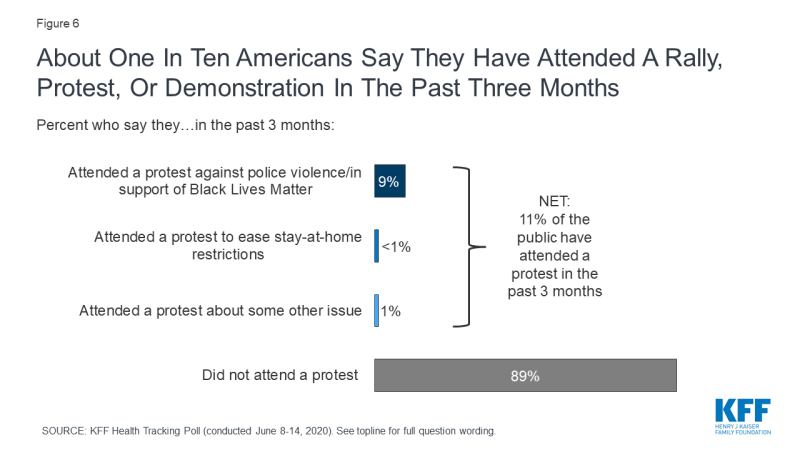
Figure 6: About One In Ten Americans Say They Have Attended A Rally, Protest Or Demonstration In The Past Three Months
Who are the 9% of Americans who have been protesting police violence and racism in the past few months? Recent protesters are likely to be younger adults, with more than eight in ten being under 50 years old, including half (52%) who are between the ages of 18 to 29. Most of those who report attending recent protests against police violence and racism are college graduates (53%). These protesters are likely to be Democrats (42%) or independents (46%) with just 6% of protesters identifying as Republicans.
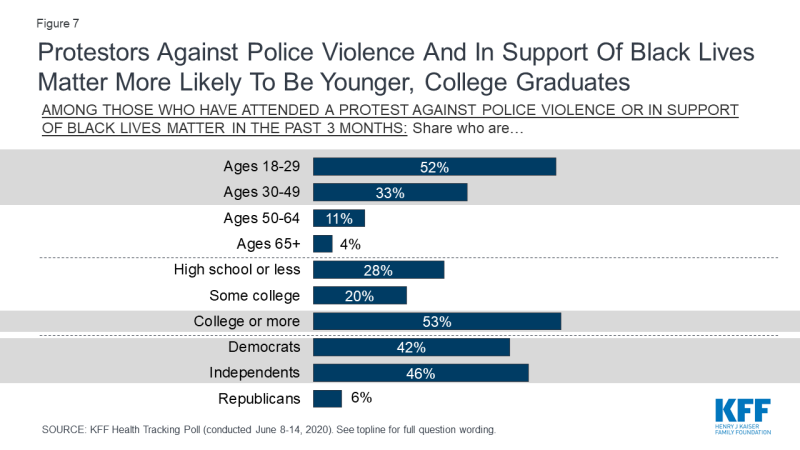
Figure 7: Protestors Against Police Violence And In Support Of Black Lives Matter More Likely To Be Younger, College Graduates
Partisans Differ in Perceptions of Racism, Police Violence, and Protests as Problems
Large shares of Americans view racism, police violence, and violence caused by protesters as at least somewhat of a problem in the U.S. today. About six in ten (58%) say racism is a “big problem,” while about four in ten say the same about police violence against the public (42%) and violence caused by protesters (38%).
While majorities across racial and ethnic groups view racism as a big problem in the U.S., the share is largest among Black adults (85%) compared with those who are Hispanic (62%) or White (53%). Racial and ethnic divisions are deeper when it comes to perceptions of the problem of police violence – 77% of Black adults say police violence against the public is a big problem, compared with just under half (47%) of Hispanic adults and about a third (34%) of White adults.
Partisan divisions in perceptions of these problems run deep. Eight in ten Democrats (82%) and a majority of independents (59%) say racism is a big problem in the U.S. today, compared with 25% of Republicans who say the same. Democrats are much more likely to say police violence is a big problem (65%) than violence caused by protesters (24%). Conversely, Republicans are much more likely to say violence caused by protesters is a big problem (62%) than to say the same of police violence against the public (14%).
| Table 2: Black adults, Democrats are more likely to say police violence is a “big problem” | ||||||
| Percent who say each of the following is a “big problem” in the U.S. today: | Party ID | Race/Ethnicity | ||||
| Democrats | Independents | Republicans | White | Black | Hispanic | |
| Racism | 82% | 59% | 25% | 53% | 85% | 62% |
| Police violence against the public | 65 | 41 | 14 | 34 | 77 | 47 |
| Violence caused by protesters | 24 | 36 | 62 | 39 | 27 | 45 |
Many Recognize Racial Disparities in Health Care and Experiences with Police Violence, but Partisan Perceptions Diverge
Overall, many adults in the U.S. recognize the disparities faced by Black and Hispanic people when it comes to health care and interactions with the police. Seven in ten adults (69%) think Black Americans are more likely than White Americans to experience police violence and a majority (56%) think Hispanic Americans are more likely than White Americans to experience police violence. A KFF analysis has shown that early data suggest coronavirus is disproportionately affecting communities of color.3 Half of the public (50%) recognize that Black Americans are more likely to get sick or die from coronavirus while fewer (36%) are aware of the disproportionate impact of coronavirus on Hispanics.4 About four in ten Americans think Black adults and Hispanic adults are more likely than their White counterparts to receive poor quality health care (42% and 38%, respectively) and to lose their job or income as a result of coronavirus (40% and 44%, respectively). More than four in ten think Black and Hispanic adults are less likely to be able to access the health care they need (44% and 45%, respectively) or to be covered by health insurance (45% and 49%, respectively).
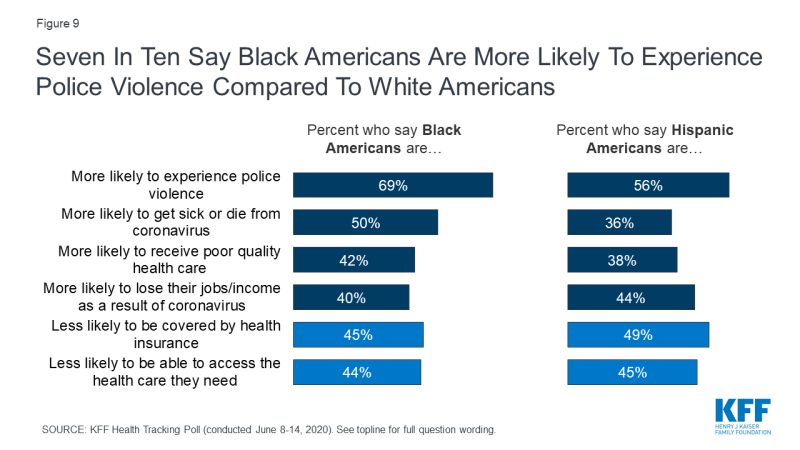
Figure 9: Seven In Ten Say Black Americans Are More Likely To Experience Police Violence Compared To White Americans
There are partisan differences in perceptions and knowledge of disparities faced by Black and Hispanic adults when it comes to health care and experiences with police. Democrats are twice as likely as Republicans to know that Black Americans are more likely than White Americans to get sick or die from coronavirus (69% vs. 34%). Similarly, 64% of Democrats know that Black Americans are less likely than White Americans to be covered by health insurance, while most Republicans (70%) say there is no difference. Nearly nine in ten Democrats (87%) know that Black Americans are more likely than White Americans to experience police violence, while 52% of Republicans say there is no difference.
| Table 3: Democrats and independents are more likely than Republicans to recognize disparities faced by Black and Hispanic Americans | ||||||
| Compared to White Americans, do you think Black Americans are more or less likely to… | Compared to White Americans, do you think Hispanic Americans are more or less likely to… | |||||
| Democrats | Independents | Republicans | Democrats | Independents | Republicans | |
| …experience police violence | ||||||
| More likely | 87% | 73% | 38% | 77% | 59% | 25% |
| Less likely | 2 | 4 | 7 | 2 | 3 | 3 |
| No difference | 11 | 21 | 52 | 20 | 36 | 71 |
| …get sick or die from coronavirus | ||||||
| More likely | 69 | 47 | 34 | 57 | 36 | 15 |
| Less likely | 1 | 3 | 2 | 3 | 4 | 2 |
| No difference | 29 | 46 | 62 | 36 | 56 | 81 |
| …be covered by health insurance | ||||||
| More likely | 5 | 6 | 10 | 8 | 7 | 8 |
| Less likely | 64 | 48 | 18 | 64 | 51 | 29 |
| No difference | 26 | 42 | 70 | 24 | 39 | 63 |

